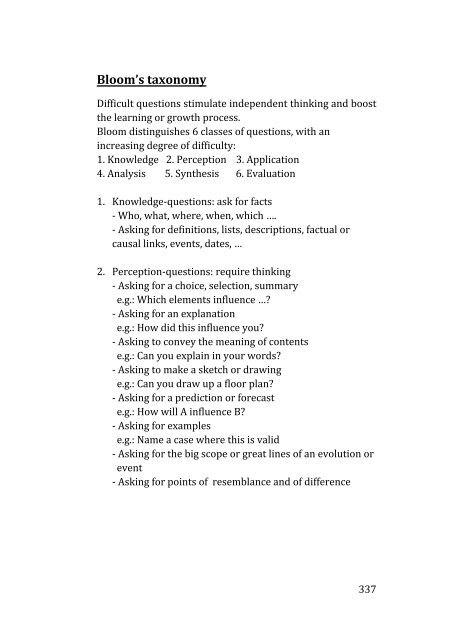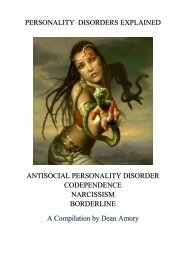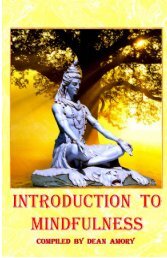- Page 2 and 3: 310
- Page 4 and 5: Title: Techniques for Personal Coac
- Page 6 and 7: TABLE OF CONTENTS 1 INTRODUCTION...
- Page 8 and 9: Techniques for Personal Coaching an
- Page 10 and 11: techniques: encouraging, paraphrasi
- Page 12 and 13: situation. By repeating coachees’
- Page 14 and 15: Good introductions for reflecting a
- Page 16 and 17: - Is there something you would like
- Page 18 and 19: Understanding, empathy and deep emp
- Page 20 and 21: - insincerity - repetition - clich
- Page 22 and 23: 3.2 ASKING QUESTIONS Asking questio
- Page 24 and 25: Exploring possible goals E.g.: Coac
- Page 26: Open questions: Obvious line to tak
- Page 31 and 32: 6. Evaluation-questions: Asking for
- Page 33 and 34: If you really do not know what to a
- Page 35 and 36: The coach wants the coachee to deve
- Page 37 and 38: Identifying obstacles If some pers
- Page 39 and 40: What do you expect if you do nothin
- Page 41 and 42: Question #8: Who Am I becoming? How
- Page 43 and 44: Now is the perfect time to do some
- Page 45 and 46: Answer the following questions and
- Page 47 and 48: If you commit time and energy to so
- Page 49 and 50: decision is also a decision which c
- Page 51 and 52: motivated you to take action and fo
- Page 53 and 54: FACIILITATIVE INTERVENTIONS 4 Catha
- Page 55 and 56: 5. Is it possible that there is ano
- Page 57 and 58: Issues with Feedback Although super
- Page 59 and 60: listener. A better sequence of stat
- Page 61 and 62: with the group” is different than
- Page 63 and 64: Remember that feedback is based on
- Page 65 and 66: Definition The reframing matrix is
- Page 67 and 68: elow shows how one might figure out
- Page 69 and 70: essence, evaluation units are placi
- Page 71 and 72: The Reframing Matrix A Reframing Ma
- Page 73 and 74: Sources: Asian Development Bank- Me
- Page 75 and 76: ME: (reality check) I haven’t hea
- Page 77 and 78:
Notice how these questions acknowle
- Page 79 and 80:
In this scenario your coachee will
- Page 81 and 82:
whether they might leave, and to as
- Page 83 and 84:
with the problem or, in some cases,
- Page 85 and 86:
1. Be curious. Ask a lot of questio
- Page 87 and 88:
personal experience that is like th
- Page 89 and 90:
If you get this wrong you will find
- Page 91 and 92:
Sources: Increasing levels of rappo
- Page 93 and 94:
A-to-Z strategies for building coll
- Page 95 and 96:
I. Focus on INNOVATION. Creativity
- Page 97 and 98:
want to create a networked organiza
- Page 99 and 100:
Practical collaboration building 'I
- Page 101 and 102:
* Celebrate and advertise success.
- Page 103 and 104:
should be rare. * Stick to your mis
- Page 105 and 106:
each other's values, knowledge, and
- Page 107 and 108:
understand. Avoid acronyms. (Common
- Page 109 and 110:
accountability. Let Go, Forgive. *
- Page 111 and 112:
One last piece of information for t
- Page 113 and 114:
1. You want to help. You are a kind
- Page 115 and 116:
ideas are absolutely great, but I c
- Page 117 and 118:
Now, do you know how to say NO? Of
- Page 119 and 120:
I’d love to help but I have a lot
- Page 121 and 122:
3.13 I-MESSAGES You can make a huge
- Page 123 and 124:
6. What do you feel like doing when
- Page 125 and 126:
a. We should avoid doing for others
- Page 127 and 128:
«And after considering all the pos
- Page 129 and 130:
and the creativity that comes from
- Page 131 and 132:
deep trust in the process of coachi
- Page 133 and 134:
they experience as a result will le
- Page 135 and 136:
personal experience with you.” Be
- Page 137 and 138:
Creative Thinking Tips Break out o
- Page 139 and 140:
It was by taking a different view o
- Page 141 and 142:
Innovation is not something that I
- Page 143 and 144:
management tools, some of which are
- Page 145 and 146:
iggest payoff. Sometimes this means
- Page 147 and 148:
Visualise success seen from the vie
- Page 149 and 150:
How to Be More Creative ? Having th
- Page 151 and 152:
These four steps are described in m
- Page 153 and 154:
Incubation is needed to handle comp
- Page 155 and 156:
"Coaching the Artist Within", "Fear
- Page 157 and 158:
Important! Edward de Bono Dr. Edwar
- Page 159 and 160:
Twyla Tharp, one of America's great
- Page 161 and 162:
28. Arrive earlier to the office th
- Page 163 and 164:
97. Make drawings of your ideas. 98
- Page 165 and 166:
4. Draw your goal. Grab some crayon
- Page 167 and 168:
Learn to notice patterns. "The geni
- Page 169 and 170:
innovative solutions to problems. C
- Page 171 and 172:
How many of us are waiting for some
- Page 173 and 174:
Step 3. Start combining the variabl
- Page 175 and 176:
492
- Page 177 and 178:
from having to keep the tank full,
- Page 179 and 180:
SAMPLE EXAMPLE: Problem Opportunity
- Page 181 and 182:
498
- Page 183 and 184:
3.17 SUMMARIZE, EVALUATE AND WRAP U
- Page 185 and 186:
STEP THREE: Check the other persons
- Page 187 and 188:
Now that you have completed level o
- Page 189 and 190:
A possible end of a session could g
- Page 191 and 192:
accomplish. Evaluating effectivenes
- Page 193 and 194:
Sources: Wendy Buckingham: http://w
- Page 195 and 196:
How Imagery Works Research has show
- Page 197 and 198:
To refocus. During practice and com
- Page 199 and 200:
http://www.usaswimming.org/ViewMisc
- Page 201 and 202:
Tips and Techniques Listed below ar
- Page 203 and 204:
individual as a group and the group
- Page 205 and 206:
For example if Bob is speaking to h
- Page 207 and 208:
RUMBA (realistic, utilitarian, meas
- Page 209 and 210:
3.19 THE MIRACLE QUESTION The mirac
- Page 211 and 212:
would ask the client to think of ot
- Page 213 and 214:
Sources: Wikipedia.org (http://en.w
- Page 215 and 216:
it doesn't matter to them if the pr
- Page 217 and 218:
3.21 SELF DISCLOSURE Coachees often
- Page 219 and 220:
This is the Gestalt notion of ‘di
- Page 221 and 222:
hunch that keeps running through yo
- Page 223 and 224:
intervention with the data I had ob
- Page 225 and 226:
3.22 USING INTUITION This is a thou
- Page 227 and 228:
the coachee's feeling or experience
- Page 229 and 230:
problem-solving, creativity and inn
- Page 231 and 232:
I partner with intelligent, success
- Page 233 and 234:
teachings refl ects similar phases,
- Page 235 and 236:
physical changes such as menstruati
- Page 237 and 238:
8. A TIME FOR WISDOM • A tranquil
- Page 239 and 240:
The word 'psychosocial' is Erikson'
- Page 241 and 242:
Erikson's psychosocial crisis stage
- Page 243 and 244:
meaning and purpose, life achieveme
- Page 245 and 246:
challenge which a person must negot
- Page 247 and 248:
He continued (in rather complicated
- Page 249 and 250:
It is not necessary therefore to un
- Page 251 and 252:
and conditioning from the previous
- Page 253 and 254:
Erikson later preferred for stages
- Page 255 and 256:
The difficulty in 'labeling' the fi
- Page 257 and 258:
1. Trust v Mistrust 'To get' 'To gi
- Page 259 and 260:
young children doing things for the
- Page 261 and 262:
5. Identity v Role Confusion 'To be
- Page 263 and 264:
8. Integrity v Despair 'To be, thro
- Page 265 and 266:
are effectively rebuilding wreckage
- Page 267 and 268:
4. Industry v Inferiority 5. Identi
- Page 269 and 270:
8. Integrity v Despair Wisdom & Ren
- Page 271 and 272:
young adult / lovers, friends, work
- Page 273 and 274:
maladaptations and malignancies Mal
- Page 275 and 276:
unrealistic, spoilt, deluded reckle
- Page 277 and 278:
Here are the main examples of alter
- Page 279 and 280:
The better that people come through
- Page 281 and 282:
3.24 THE DRAMA TRIANGLE The Drama T
- Page 283 and 284:
Mary: Well, little Johnny fell and
- Page 285 and 286:
The Empowerment Dynamic From Wikipe
- Page 287 and 288:
upon the aid of others. This is a f
- Page 289 and 290:
3.25 VOICE DIALOGUE Ever feel a bat
- Page 291 and 292:
Just knowing that the voices are re
- Page 293 and 294:
3.26 CONFRONTATION Confrontation do
- Page 295 and 296:
A coachee has become a coachee beca
- Page 297 and 298:
The Art of Constructive Confrontati
- Page 299 and 300:
Confrontation’s Bad Reputation Ca
- Page 301 and 302:
DiSilvestro and Hoover’s construc
- Page 303 and 304:
greatest opportunity for personal a
- Page 305 and 306:
weekly, monthly, and quarterly asse
- Page 307 and 308:
facilitated the team member’s gro
- Page 309 and 310:
3.27 PROVOCATION solution-focused c
- Page 311 and 312:
16. Total disagreement If that is t
- Page 313 and 314:
10. Apply to Self: How could you se
- Page 315 and 316:
capable of awareness and attention.
- Page 317 and 318:
The Benefits of Mindfulness Practis
- Page 319 and 320:
deflate the story and cultivates wi
- Page 321 and 322:
4. SHOWER. I actually use this one
- Page 323 and 324:
3.30 HUMOR Apparently laughter is t
- Page 325 and 326:
The thing with humor, like with all
- Page 327 and 328:
5. Be on time. Another way to demon
- Page 329 and 330:
Yes, it is contradictory! How can y
- Page 331 and 332:
Friends, join me in the celebration
- Page 333 and 334:
An endorsement is much more fun to
- Page 335 and 336:
Sources: Onelife Coaching - http://
- Page 337 and 338:
Signs of giving full attention to a
- Page 339 and 340:
3.34 TRUST Coaching and relationshi
- Page 341 and 342:
There are four basic feelings: Ang
- Page 343 and 344:
Respect usually leads to liking, an
- Page 345 and 346:
other person will continue to be ni
- Page 347 and 348:
Steven Covey, The 7 Habits of Highl
- Page 349 and 350:
positively. If you can accept your
- Page 351 and 352:
Nonetheless it is useful for coache
- Page 353 and 354:
appraisal-focused (adaptive cogniti
- Page 355 and 356:
one should communicate with people
- Page 357 and 358:
- noting however that "behind all a
- Page 359 and 360:
In Aggression, also known as the "M
- Page 361 and 362:
However, the "tend-and-befriend" re
- Page 363 and 364:
How to use the self-rating Diagnost
- Page 365 and 366:
5. How do you see your world? * how
- Page 367 and 368:
Capture any immediate thoughts that
- Page 369 and 370:
If they wish, they may use their se
- Page 371 and 372:
How to Make a Personal Development
- Page 373 and 374:
meeting up with someone often, near
- Page 375 and 376:
2.1 How does your current situation
- Page 377 and 378:
Step 3 - Generating options You now
- Page 379 and 380:
If you weren’t afraid at all, if
- Page 381 and 382:
Go ahead, pick your three actions f
- Page 383 and 384:
for a year (giving you over 150 lif
- Page 385 and 386:
Weekly Accountability Whether you a
- Page 387 and 388:
does add a bright spot to their day
- Page 389 and 390:
Things I accomplished since my last
- Page 391 and 392:
What habits, activities, or thought
- Page 393 and 394:
3. Completing a Coaching Series At
- Page 395 and 396:
3.40 JOINING THE COACHEE THROUGH MA
- Page 397 and 398:
move to the second phase of the the
- Page 399 and 400:
3.41 PARADOXICAL INTERVENTIONS “D
- Page 401 and 402:
3.42 EMPTY CHAIR TECHNIQUE This is
- Page 403 and 404:
3.43 THE HUNGER ILLUSION No, this i
- Page 405 and 406:
top dollar to use it, you can try i
- Page 407 and 408:
3.44.1 VALIDATION COACHING Validati
- Page 409 and 410:
3.44.2 VALIDIATION Validation is a
- Page 411 and 412:
Validation Defined Simply put, vali
- Page 413 and 414:
Imagine that the listening friend,
- Page 415 and 416:
When the listener restricts her com
- Page 417 and 418:
Validating Feelings about You One o
- Page 419 and 420:
3.45 CHALLENGE EXISTING PATTERNS To
- Page 421 and 422:
To be able to let go of ingrained p
- Page 423 and 424:
3.46 SOLUTIONS AND SUCCESSES TO DAT
- Page 425 and 426:
prophecy. Over time, he reframed th
- Page 427 and 428:
performance or negative consequence
- Page 429 and 430:
Here's how self-talk works. Pete Sa
- Page 431 and 432:
contributed to Fernandez's gaining
- Page 433 and 434:
If a person who has a long history
- Page 435 and 436:
I will never be able to do this. I
- Page 437 and 438:
is power in waking suggestion… su
- Page 439 and 440:
META COMMUNICATION When you want to
- Page 441 and 442:
Meanwhile, discover their values an
- Page 443 and 444:
Only after you have created suffici
- Page 445 and 446:
Telling the listener what they know
- Page 447 and 448:
6. Tell Stories with embedded comma
- Page 449 and 450:
spotted this pure strip of land, hi
- Page 451 and 452:
9. USE PRESUPPOSITIONS Presuppositi
- Page 453 and 454:
having to say. Confident that they
- Page 455 and 456:
how they really feel. “Yes” is
- Page 457 and 458:
scenes you see in your mind. You ca
- Page 459 and 460:
In the case of competitive sports,
- Page 461 and 462:
Ways In Which to Use Visualization
- Page 463 and 464:
Studies in mental imagery have show
- Page 465 and 466:
hear and feel those great feelings.
- Page 467 and 468:
index of arousal - and can be emplo
- Page 469 and 470:
Add the movement or kinesthetic fee
- Page 471 and 472:
MENTAL IMAGERY INTRODUCTION Welcome
- Page 473 and 474:
* * * * * * * * Look at the column
- Page 475 and 476:
that you imagine hearing when looki
- Page 477 and 478:
2-CLEANING THE SUBCONSCIOUS Right n
- Page 479 and 480:
The first step is to relax. Consequ
- Page 481 and 482:
Listening to a song inspires memori
- Page 483 and 484:
experiences. Rather than pulling yo
- Page 485 and 486:
On the contrary, these techniques a
- Page 487 and 488:
had experienced, the success image
- Page 489 and 490:
anchoring), as though you were pres
- Page 491 and 492:
Closing your eyes, say them in watc
- Page 493 and 494:
think that by limiting your ambitio
- Page 495 and 496:
For the future, try to make one exe
- Page 497 and 498:
12-The creative process Some people
- Page 499 and 500:
Real life example: There is everywh
- Page 501 and 502:
that their feet are webbed. This vi
- Page 503 and 504:
Creativity is expected to explode a
- Page 505 and 506:
This map shows a research for disco
- Page 507 and 508:
You can take notice that the proces
- Page 509 and 510:
DO IT YOURSELF: We do not expect th
- Page 511 and 512:
Borrowed Genius Step Two Now invite
- Page 513 and 514:
About Win Wenger This exercise come
- Page 515 and 516:
Mmm. Sounds good. It's not the kind
- Page 517 and 518:
Challenging is not meant to be a co
- Page 519 and 520:
5. Gentle Suggestion If you are stu
- Page 521 and 522:
3.53 MODELING - COACHING - SCAFFOLD
- Page 523 and 524:
Counterexample critical aspects and
- Page 525 and 526:
NLP Modeling involves transferring
- Page 527 and 528:
learning everything they can by fol
- Page 529 and 530:
Basic Problem Definition Step 1 Ste
- Page 531 and 532:
o Problem articulation and framing:
- Page 533 and 534:
Source: Leading With Questions How
- Page 535 and 536:
4. Always Review Positively If we a
- Page 537 and 538:
3.56 HEAD ON COLLISION A client has
- Page 539 and 540:
and defeating therapy: Now the view
- Page 541 and 542:
complex, elegant, aged-to-perfectio
- Page 543 and 544:
3.58 PRIMAL THERAPY Cool comes in m
- Page 545 and 546:
3.59 FOCUSING When a coachee decide
- Page 547 and 548:
855
- Page 549:
857


















